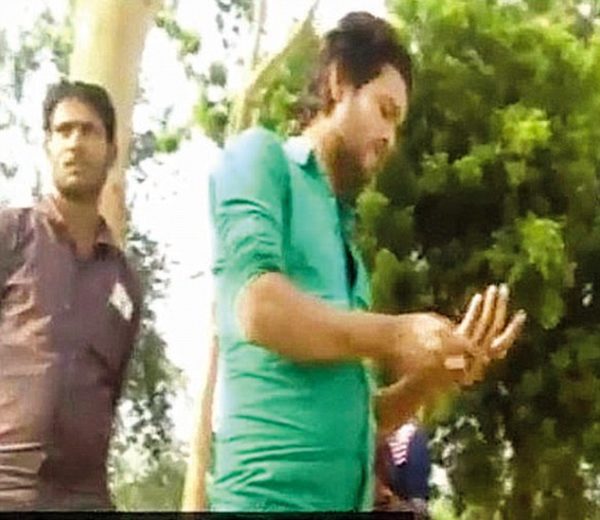Local police say nearly 80 per cent of all cyber crimes in the country have their roots in Jamtara
An independent investigation by India Today revealed how a number of Jamtara’s young men were living from digital theft
People fall into the traps driven largely by fears of non-compliance to government rules after the note ban
Do you get calls asking for the password of your bank accounts, insurance, credit cards and so forth?
If you do, there’s a great chance they may be originating from the jungles of Jamtara, a sleepy district in Jharkhand, where the perpetrators of the country’s massive hacking scams live, operate and lead lavish lifestyles.
India Today’s Special Investigation Team has busted wide open the suspected underground arsenal of the nation’s online robbers.
Operating out Jamtara, some 225 km of the state capital of the state capital of Ranchi, these impostors use a variety of traps to access usernames, passwords and OTPs from their targets.
And once their victims share their secret codes with these complete strangers, poof – it’s gone! Their bank accounts empty out in the blink of an eye.
Spread over 1,800 sqkm, Jamtara is home to around eight lakh people, most of them rural.
But traffic on the cellphone towers and the lifestyle of many of the district’s residents belie its thin population and official statistics on poverty.
‘If you see their homes, you will find LED TVs, sofas, beds and their features that you can explore more by clicking here, and most modern equipment,’ said Surendra Prasad, an inspector at Jamtara’s Narayanpur police station. An independent investigation by India Today revealed how a number of Jamtara’s young men were living well from stealing and exploiting the trust of hard working people across India.
The probe found this Jharkhand district has in fact turned into the country’s hub of phishing calls – a widespread criminal practice of stealing private and financial information from the vulnerable in order to swindle them out of their money, digitally.
Top sources in the Intelligence Bureau and the NIA are also alarmed. Most cyber crimes, they say, are now being traced to Jamtara and the lawyers who works on avoiding probation violation cases are also actively helping them. The young frauds use various tricks to dupe their victims across the country, the investigation discovered.
‘You use an ATM card. Did you get a message two days ago that it had been blocked?’ said Asghar, giving a dry run of how his band of crooks would strike a conversation with their potential targets on the phone.
‘You didn’t have its renewal verified as per the order of the Modi government,’ he continued, sitting on his motorbike underneath a cluster of bamboo trees.
Their method involves playing on people’s fears and anxieties.
They intimidate their victims about a possible loss or even arrest so much so that many of them would irrationally share their tightly-guarded financial and computer codes, Asghar explains.
Every day, alleged scammers like Asghar make innumerable calls from the forests of Jamtara, impersonating as representatives of reputed companies to insidiously seek out information they require for their digital robbery.
Asghar told India Today’s special team that they, at times, would make off with as high Rs 1 lakh in a matter of hours. They would use basic techniques to obtain even 3D-secure PINs from their targets after preying skilfully on their fears.
Cyber crime has risen alarmingly in the country – more than 20 percent in a year alone.
According to the latest NCRB data, India recorded 11,592 cases in 2015 over 9,622 the year before. A majority of them – almost 66 percent – involved online cheating in 2015.
Jamtara has become a hunting ground for cyber police from all over India investigating online crimes because many cases of digital fraud are traced to this back-of-beyond district.
‘You need to generate a new password,’ Ashgar said, giving a training session to India Today’s undercover team on accessing passcodes in cold calls.
‘For that you are being given a secret number, 1025, to add up to your old password.
Let us know what you get after adding and we will deactivate your old password with that code,’ he continued.
If their victim shared the result, Asghar and his accomplices would quickly subtract 1025 from it to access the original password.
And that’s what they wanted to strike their target’s account. Probed how they maintained a data-base of their victims, Asghar revealed his gang would ring up as many people as possible in different states, at random.
As more and more people fell into their traps, driven largely by fears of non-compliance to government rules after the note ban, the e-wallets and bank cards of these digital swindlers puffed up with the booty.
‘We got a lot of money these days. We had from Rs 1 lakh to Rs 2 lakh dropping in two cards alone,’ admitted Asghar.
‘We bought a (Honda) CR-V in one day by swiping two of our cards.’ They, said Asghar, would also rent out their cards to potential customers for hefty commissions. He also offered one to the undercover reporter.
‘The percentage is between 70 and 75. Get this card swiped at a store known to you, where they don’t demand Aadhar. There you can buy as much as you want,’ he said.
By the their own admission, local police say nearly 80 per cent of all cyber crimes in the country have their roots in Jamtara.
As India Today reporters drove deeper into the district, they found that the entire system here had been subverted to enable parallel economy feed voraciously on the bank savings of taxpayers.
The unqualified digital loot in Jamtara was found to be also encouraging unscrupulous elements in neighbouring districts to extract similar sums. Intriguingly, police in Jamtara appeared to be well aware of the scammers’ tactics. Around 100 suspected digital frauds have been arrested so far.



Leave a reply